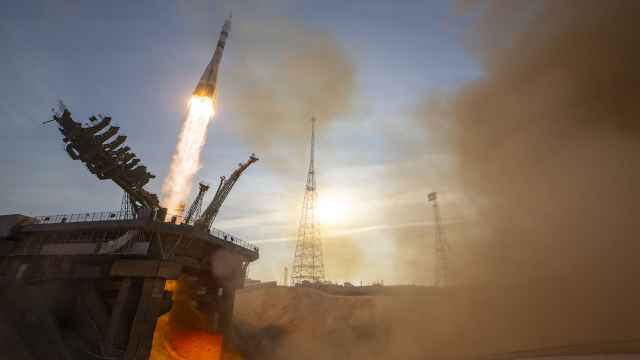An experiment that saw dozens of animals blasted into orbit on a satellite has provided new insights as to why astronauts' eyesight deteriorates in space.
Vladimir Sychev, deputy director of the Institute of Medical and Biological Studies, said the experiment revealed the capacity of the cerebral arteries plummets in space, which accounts for reduced vision.
"We used to think that in zero-gravity, fluid traveled upward and that the quality of [blood] improved, but it turns out that it is the other way around," Sychev said. "The arteries of the brain come under duress and their capacity is reduced by 40 percent."
The institute also gained useful information about the impact of space travel on the spinal cord, inner ear and processes at the genetic level, Sychev said.
In April, Russia launched its first biological research satellite since 2007, the Bion-1M, on a 30-day mission to research the effect of being in orbit on the human body. The study aims to help pave the way for interplanetary flights, including missions to Mars.
Sychev said the mission was a success although few of the animals sent into space returned alive.
Passengers on the Bion-M1 included 45 mice, eight Mongolian gerbils, 15 geckos, slugs, snails and containers of microorganisms and plants. The flight proved fatal for all eight Mongolian gerbils and 29 out of the original 45 mice. The geckos, slugs and snails survived.
A Message from The Moscow Times:
Dear readers,
We are facing unprecedented challenges. Russia's Prosecutor General's Office has designated The Moscow Times as an "undesirable" organization, criminalizing our work and putting our staff at risk of prosecution. This follows our earlier unjust labeling as a "foreign agent."
These actions are direct attempts to silence independent journalism in Russia. The authorities claim our work "discredits the decisions of the Russian leadership." We see things differently: we strive to provide accurate, unbiased reporting on Russia.
We, the journalists of The Moscow Times, refuse to be silenced. But to continue our work, we need your help.
Your support, no matter how small, makes a world of difference. If you can, please support us monthly starting from just $2. It's quick to set up, and every contribution makes a significant impact.
By supporting The Moscow Times, you're defending open, independent journalism in the face of repression. Thank you for standing with us.
Remind me later.





